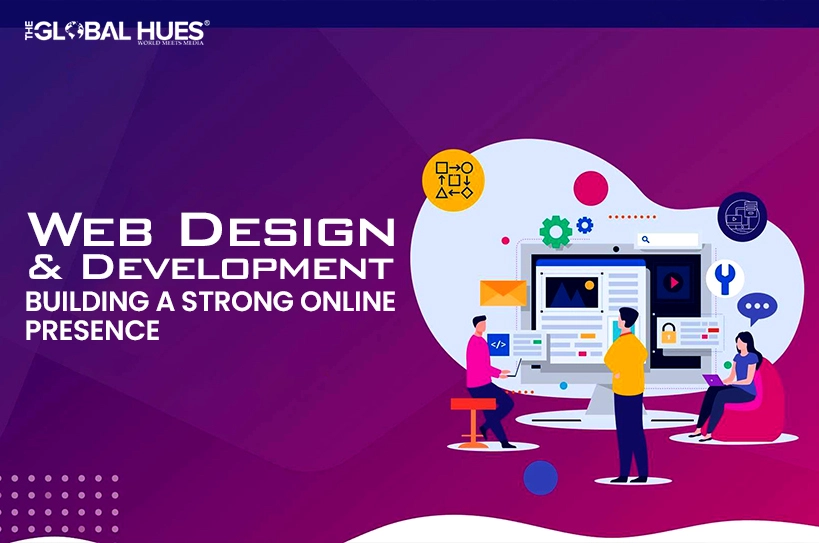In today’s digital world, having a strong online presence is essential for any business or individual aiming to connect with a broader audience. One of the most important elements of this online presence is a well-designed and well-functioning website. Web design and development play a crucial role in creating a platform where your audience can learn about your brand, services, and products.
In this article, we will explore key aspects of web design and development, including branding services, custom website design, WordPress website design, and website hosting.
The Role of Branding in Web Design
Before we learn more about the technicalities of web design, let’s understand what is branding. A brand is more than just a logo or a color scheme – it’s the identity of your business. Branding encompasses the values, voice, and visual elements that define who you are and what your company stands for. Effective branding allows you to create a memorable impression on your audience, which helps build trust and loyalty over time.
In web design, branding plays a vital role. Your website is often the first point of contact potential customers have with your brand, so it needs to reflect your brand’s personality. This includes the color palette, typography, images, and even the tone of the content. For instance, if you run a law firm, your branding should convey professionalism and trust. On the other hand, if you own a creative agency, your branding might be more vibrant and playful to attract a different kind of audience.
Businesses can always avail for professional branding services can help you craft a consistent and cohesive brand image that translates well for your website. These services typically involve logo design, defining your brand’s color schemes, and creating a style guide that ensures consistency across all platforms.
Custom Website Design: Tailoring the User Experience
Once your branding is in place, the next step is custom website design. A custom-designed website is built from scratch to meet the specific needs of your business. Unlike pre-made templates, custom website design allows you to have complete control over how your website looks and functions.
Custom website design focuses on user experience (UX). UX is all about how easy and pleasant it is for users to navigate your site. If visitors find it difficult to find the information they need, they’ll likely leave your site and look elsewhere. A well-designed custom website ensures that users can easily navigate the pages, find what they’re looking for, and interact with your content without frustration.
It also means that your website can be tailored to suit your target audience. For example, if your audience is older, you might want larger fonts and simpler navigation. If your audience is younger and more tech-savvy, you can include more dynamic elements, like animations or interactive content, that appeal to them.
Beyond aesthetics, a custom-designed website can be optimized for performance. Slow-loading websites or websites that aren’t mobile-friendly can drive users away. By working with professional web designers, you can ensure that your website is not only visually appealing but also fast, responsive, and user-friendly on all devices.
WordPress Website Design: The Power of a Flexible Platform
While custom website design offers maximum flexibility, some businesses may prefer a more cost-effective solution that still offers plenty of customisation options. That’s where WordPress website design comes in.
WordPress is a popular content management system (CMS) that powers over 40% of websites on the internet. It’s known for its flexibility, ease of use, and scalability, making it an excellent choice for businesses of all sizes. Whether you’re a small startup or a large corporation, WordPress offers tools and features that can help you create a website that fits your brand and goals.
One of the key advantages of WordPress website design is the wide range of themes and plugins available. These themes allow you to change the overall look and feel of your website without needing to know how to code. Many themes are highly customisable, allowing you to tweak colors, fonts, and layouts to match your branding.
Whereas, Plugins helps extend the functionality of your website. For instance, if you want to add a contact form? There’s a plugin for that. Need an SEO tool to help improve your site’s ranking on search engines? WordPress offers plenty of SEO plugins that can help you optimise your content. This flexibility makes WordPress an excellent platform for businesses that want a customisable website without the need for a full custom-built solution.
For those new to website creation, harnessing this flexibility to build a functional site might seem overwhelming at first. However, numerous step-by-step tutorials exist to demystify the process, guiding beginners through everything from selecting a domain to installing WordPress and choosing the right hosting. Understanding these foundational steps is crucial for establishing a robust online presence without prior technical expertise. Many find that visual, practical guides, such as a detailed CreateWPsite bluehost guide, can provide invaluable assistance, ensuring a smooth setup and launch for their first WordPress website.
Website Hosting: The Foundation of Your Online Presence
After designing and building your website, it’s important to ensure that it’s accessible to your audience. This is where website hosting comes in. Website hosting refers to the service that allows your website to be stored and accessed on the internet.
When someone types your website’s domain name into their browser, their computer connects to the server where your website is hosted, allowing them to view your site. Without hosting, your website wouldn’t be accessible to anyone. There are different types of hosting services available, and choosing the right one depends on your business’s needs.
Let’s look at each of them briefly:
-
Shared Hosting
It is the most ideal and affordable option for small businesses or personal websites. With shared hosting, your website shares server space with other websites. While this keeps costs down, it can affect performance, especially if one of the other websites on the server experiences a traffic spike.
-
VPS Hosting (Virtual Private Server)
VPS hosting offers a step up from shared hosting. Although you still share a server, each website has its own allocated resources. This means that your website’s performance won’t be affected by other sites on the server.
-
Dedicated Hosting
With dedicated hosting, you have an entire server dedicated to your website. This offers the best performance and security, but it comes at a higher cost. Dedicated hosting is typically used by large businesses or websites with very high traffic.
-
Cloud Hosting
Cloud hosting is a scalable option where your website is hosted on a network of servers. This allows for flexibility, as resources can be increased or decreased depending on your needs. It’s a good choice for businesses that expect their traffic to fluctuate.
Choosing the right hosting provider is crucial for ensuring that your website remains accessible, loads quickly, and stays secure. Many hosting providers also offer additional features, like automated backups, security monitoring, and customer support, which can be incredibly valuable for maintaining your website’s performance.
Conclusion
Web design and development involves various elements that work together to create an effective online presence for your brand. This includes branding, custom website design, WordPress design, and hosting. Investing in professional services ensures your website looks good and works well, giving users a positive experience.




